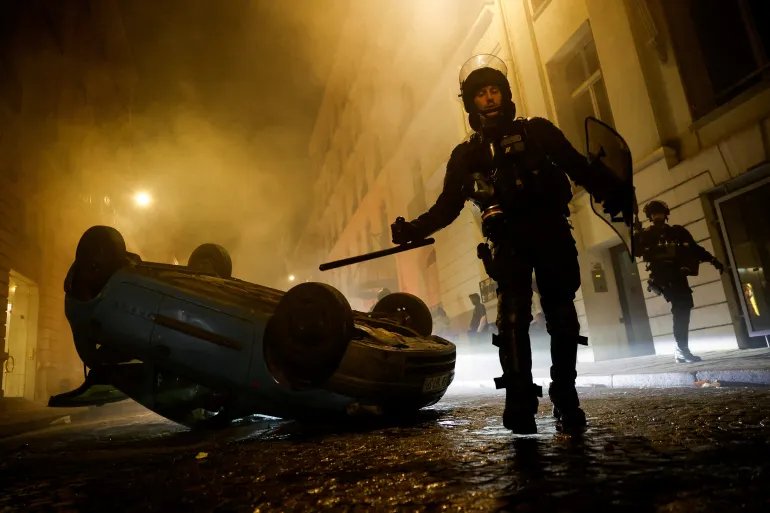France
Erdogan Attributes France Riots To “Institutional Racism”

Institutional Racism:
Turkish President Recep Tayyip Erdogan highlights “institutional racism” and France’s colonial heritage amid widespread demonstrations. The shooting of 17-year-old French-Algerian Nahel M by a police officer after a traffic check sparked the uprising. Erdogan, a Muslim supporter, blames “Islamophobia” and France’s colonial past for the unrest.
Erdogan’s criticism goes beyond the present to examine colonial social infrastructure. He claims that cultural racism has become systemic, disproportionately harming immigrants, especially Muslims, who are assigned to ghettos and subjugated. Thus, the unraveling in France shows how historical legacies affect modern society.
The Human Cost And Social Impact Of France’s Unrest
The six-day riots have destroyed extensive property and damaged Parisian public infrastructure, costing 20 million euros ($21.8 million). Erdogan denounces the protestors’ theft and violence, saying the streets should not be used for justice. The demonstrators, many of whom are juveniles, have burned vehicles, destroyed infrastructure, and fought police.
Erdogan urges authorities to learn from the social eruption and grasp the root causes of the upheaval. As protests develop in France, the human cost becomes clear, sparking a discussion about society and the urgent need to address dissatisfaction.
Global Implications And Intersectionality In The Face Of Racism
Erdogan emphasizes the worldwide effect of systemic racism and colonialism. France’s events demonstrate how historical and modern issues are linked. Erdogan’s opinion, as a global champion for Muslims, calls for a critical study of the social fabric that sustains not just the disturbance in France but also international discussions on racism and social justice.
Erdogan’s perspective reminds France that racism and social injustice are global as it mourns Nahel M. Instead, they build a complicated network of global concerns that requires collective contemplation and action to solve structural issues that cause discontent.
The Complex Dynamics Of Islamophobia And Social Unrest
Erdogan’s claim that Islamophobia is causing French turmoil initiates a severe dialogue on religious discrimination and social instability. Islamophobia’s connection to the country’s colonial heritage illuminates cultural attitudes that marginalize Muslim populations. This tale goes beyond the immediate events, prompting a deeper look at how past prejudices affect modern encounters.
France, a secular nation, has struggled with religious identity and assimilation. Erdogan’s recognition of Islamophobia as a cause raises questions about Muslim communities’ struggles in a country with systematic biases despite its values of liberty and equality. Thus, the riots highlight the necessity for inclusive conversation that tackles religious and cultural identities as part of a giant fight against ingrained prejudices.
Lessons From The Unrest: Calls For Social Reform And Justice
Erdogan’s demand for authorities to learn from the social eruption emphasizes social transformation and fairness beyond condemning violence. The riots remind us that disturbance typically indicates deeper social concerns that must be addressed. Erdogan thinks that the French unrest requires a thorough assessment of societal systems, especially those that persecute minorities.
Long-term solutions need inclusion, institutional reform, and addressing fundamental imbalances that cause dissatisfaction. The events in France sparked a discussion on social change, encouraging politicians to go beyond reactive measures and take proactive steps to create a more equal and just society.
Navigating The Global Conversation On Racism And Colonial Legacies
Erdogan’s worldwide advocacy for Muslims links the events in France to the more extensive discourse on racism and colonial legacies. The riots highlight how colonial and cultural inequities affect the world. Erdogan’s comments make the international community reconsider its role in resolving systematic societal discontent.
Nations may discuss racism while the world observes the events in France, realizing that the fight against prejudice is a global one. Erdogan’s viewpoint promotes a more comprehensive and integrated understanding of minority populations’ worldwide concerns and the necessity for collaboration to deconstruct entrenched systems perpetuating inequity.
Read Also: France’s Police Racism: A Call For Global Scrutiny
Youth Unrest And The Cry For Socioeconomic Equality
The majority of demonstrators are minors, revealing a deep-seated social dissatisfaction among adolescents. Erdogan’s criticism of looting and violence refers to youth anger with societal inequities. The events in France highlight the need to address ethnic, religious, and social problems that alienate adolescents.
Erdogan’s focus on the streets not being a place for justice raises questions about underprivileged populations, notably youth,’s few voice channels. Thus, the riots reflect a more significant battle for socioeconomic equality, prompting governments to promote inclusive policies that close the income gap and empower marginalized youth.
Media Narratives And Their Role In Shaping Public Perception
Media narratives shape public perception, and Erdogan’s opinion on the French riots highlights this. Presenting internal and worldwide discontent frames the concerns. Erdogan’s labeling of “Islamophobia” and systemic racism calls for reasonable media coverage beyond sensationalism.
The media environment after the riots is crucial to understanding how prejudices and preconceptions are reinforced. Erdogan’s global viewpoint enables critical analysis of how media portrayals may increase tensions or illuminate complicated social unrest. Thus, the events in France need media outlets to promote debate and remove misconceptions.
Diplomatic Implications And The Fragility Of International Relations
Erdogan’s remarks add a diplomatic dimension to France’s uprising, emphasizing the fragility of foreign ties during social unrest. As a global leader, Erdogan’s statements may affect how the events are interpreted elsewhere. The interaction between geopolitics and social concerns shows how domestic instability affects diplomacy.
The events in France remind us that social concerns, especially those based on racism and historical injustices, have diplomatic repercussions. Erdogan encourages international leaders to address social unrest’s core causes, creating a more collaborative and empathic approach to global issues.













You must be logged in to post a comment Login